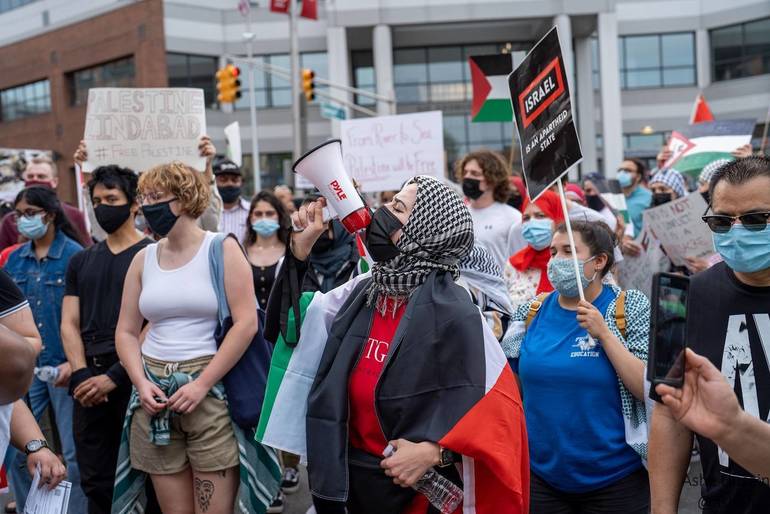On December 12, the Rutgers University chapter of Students for Justice in Palestine (SJP) learned that the university was suspending the group from all organizational activity, effective immediately. According to a statement released on Instagram, the University didn’t bother notifying Rutgers SJP directly, and the students learned of the suspension from a reporter who got in touch for more information. Their faculty supervisor was also unaware of the suspension, and the group had received no prior warnings or reprimands about their activity.
Students for Justice in Palestine has long been a target of Zionist organizations — many of the profiles on the Zionist website Canary Mission, which aims to track and draw attention to pro-Palestine activists in higher education, are of SJP members. Fordham University banned the club in 2016, and more recently, Governor Ron DeSantis banned it from operating at public colleges and universities in Florida and Columbia University suspended its own SJP chapter. According to Rutgers SJP, however, this is the first time a public university has chosen to shut down an SJP chapter of its own volition, not at the command of a governor. They also said the University has offered no evidence or examples to substantiate its claims about the alleged code of conduct violations, and that “the administration’s letter contributes to the perception of Arab and Palestinian students on campus as terrorist threats, a racist and unacceptable caricature.”
This suspension of campus activity comes only one week after a congressional hearing with three university presidents that tried to frame the use of the word “intifada” and the chant “from the river to the sea” as calls for a genocide against Jewish people. After her testimony, Liz Magill, the former president of the University of Pennsylvania, resigned due to widespread backlash to her stated support of free speech on campus and failure to challenge the premise that these chants are antisemitic or constitute violent threats. This hearing, combined with the House of Representatives’ recent vote to define anti-Zionism as antisemitism, is increasing pressure on universities to crack down on anti-Zionist demonstrations. Shortly after the hearing, Governor Kathy Hochul sent a threatening message to the administrations of New York’s public colleges and universities along these same lines.
Rutgers AAUP-AFT, the union representing full-time faculty and graduate assistants at the university, is one of only a few AFT locals to explicitly call for a ceasefire, while the AFT as a whole has taken a strong pro-Israel stance. While Rutgers is severely limited in its ability to hamper the union’s political speech under labor law, it has considerably more power over student organizations. Every attack on pro-Palestine activism on campus is part of the same struggle. Rutgers workers must stand strong in support of the Rutgers SJP students and fight for the reinstatement of the club.
Meanwhile, pro-Palestine organizing at Rutgers and in other places in northern New Jersey continues. Students and workers at New Jersey Medical School, affiliated with Rutgers, have organized a die-in scheduled for December 18 to call out Senator Cory Booker’s support for Israel, and residents of several towns in Essex County just organized the first of many “Sundays for a Ceasefire.”
The suspension of Rutgers SJP is a disgusting example of political repression, and it is unfortunately only one of many. But even as repression from university administrations and the government grows, students and workers must continue organizing in their schools and workplaces in support of Palestine and its people. Students, faculty, and staff can join the national network of individuals and campus organizations dedicated to supporting one another against political repression at our colleges and universities, which includes National Students for Justice in Palestine and the SJP chapters of several dozen campuses. The genocide of the Palestinians is being funded with U.S. tax dollars and enacted with U.S. weapons. Solidarity with Rutgers SJP, and with all people and organizations facing repression for speaking out for Palestine.











